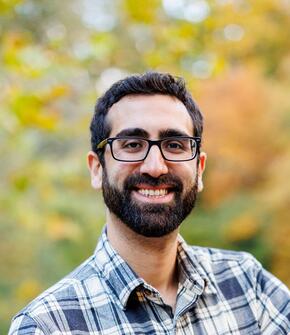Behind the Scenes with Akiva Fishman, Manager, Forests & Climate
- Date: 07 April 2022
In our Behind the Scenes series we speak to WWF staff to learn more about their work and what makes them tick. For today’s post, we had the pleasure of catching up with Akiva Fishman, WWF's Manager of Private Sector Interventions to Tackle Deforestation and Forest Degradation.

What is your position at WWF and what does it entail?
I’m a Manager on WWF’s Forest team working at the intersection of deforestation and supply chain sustainability. Part of my role is to work with companies on setting and implementing policies to eliminate deforestation from their commodity sourcing. At the same time, I help companies partner with a diversity of other stakeholders as part of large-scale, place-based initiatives to tackle underlying drivers of nature loss that require broader collaborative efforts.
Describe your favorite moment in nature.
I’m a sucker for monkeys, so they feature in many of my favorite moments. One memorable encounter came during a solo hike in a park on the Indonesian side of Borneo. Alone on a trail that was growing increasingly difficult to follow, and not yet having spotted any of the monkeys I was hoping to find, I heard a telltale rustling and my heart raced. But it turned out only to be a squirrel and I decided I would start heading for the trailhead, losing faith. As I turned to head back, I saw a group of maroon leaf monkeys not 30 feet away going about their business in the branches. My very favorite natural encounter is getting to be still and watch monkeys with no one else around.
What advice would you give a young professional who is interested in sustainability?
Sustainability is a big field with lots of sub-disciplines. It can be hard to choose one area to focus on, but it can be helpful early on in a career to build one or two areas of expertise in arenas you’re especially passionate about. This can help differentiate you in an increasingly crowded space when you’re looking for a first job. That’s not to say generalists can’t make it! But it’s perhaps more common to branch out to adjacent fields after having picked up solid experience in one or two areas from which to build.
What are you currently reading or watching on TV?
I’m generally in the middle of one fiction and one non-fiction at the same time. On the fiction side, I’m currently reading The Liberated Bride by A.B. Yehoshua. It’s fabulously well written and feels a bit Mrs. Dalloway-esque in that I might read 50 pages before realizing that only an hour has passed in the book’s narrative because of how deeply and convincingly Yehoshua probes character depth. For non-fiction, I recently finished Simon Winchester’s The Meaning of Everything, about the compiling of the Oxford English Dictionary. Although a bit tedious at times, it gives fascinating insight into the process of creating dictionaries and great color on the odd personalities involved in the OED project. On TV I just finished Inventing Anna, which was excellent and made me feel like I didn’t pay close enough attention to the news five years ago.
What brings you joy outside of work?
Any opportunity I get to be outside! I try getting in a 20–40-mile bike ride on Sunday mornings, though the addition of a 1-year-old to our family has made that trickier. In the meantime, I’ve been enjoying morning walks with my daughter that we’ve turned into a treasure hunt to seek out and map all the Little Free Libraries within ~30 minutes of our house. We’ve surpassed 40 so far and are still at it!
What does the future of sustainable business look like to you?
Corporate sustainability has been evolving over the past several decades to embrace increasing levels of responsibility for addressing environmental challenges. The leading companies today are those that – in line with Science-Based Targets – are reducing their climate and nature impacts to the greatest extent possible and compensating for the small remaining impact that isn’t possible to eliminate. Looking forward, the leading edge of corporate sustainability will encompass a greater degree of collaboration than is currently the norm between companies and a range of stakeholders (government, civil society, local communities, corporate peers) to address systemic drivers of nature decline in key commodity-producing landscapes. In these partnerships, companies will play a pivotal role by leveraging their market demand, convening ability, and advocacy voice to transform commodity production systems into systems that maintain ecological integrity at landscape level.